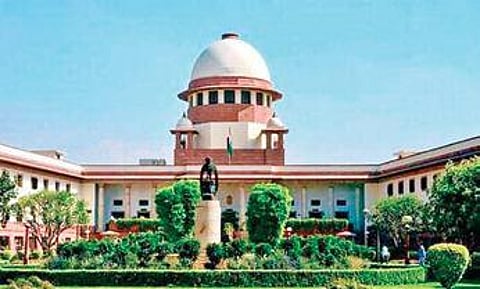Pegasus row: SC appoints probe panel, says state can't get 'free pass' every time national security is raised
NEW DELHI: In a hard-hitting order on the Pegasus snoopgate on Wednesday, the Supreme Court while constituting a three-member technical probe panel, said the state cannot get a free pass every time citing national security. It said the court can’t remain a mute spectator when citizens need to be protected from violation of their privacy.
A three-member bench led by Chief Justice of India N V Ramana said it did not want to enter into any political thicket but India cannot remain silent to allegations of snooping when other countries have taken them seriously and kick-started efforts to know the truth. Pegasus is an Israeli spyware that is known to have targeted members of the civil society, including activists and journalists.
The committee comprising experts in cyber security, digital forensics, networks and hardware would be overseen by a supervisory panel led by former Supreme Court judge R V Raveendran (see box).
Extensively dealing with the right to privacy, the bench said restrictions can be permitted, but they have to stand constitutional scrutiny.
“In today’s world, restriction on privacy is to prevent terrorism activity and can only be imposed when needed to protect national security.” Surveillance and how it is exercised, affects the right and freedom of people. Such technology may have a chilling effect on right to press, it said.
The court rejected the Centre’s proposal to allow it to appoint the expert panel, saying it would violate the settled judicial principle against bias. “Justice should not only be done but seen to be done,” it said while slating the hearing after eight weeks.
The ruling quoted from George Orwell’s 1984, “If you want to keep a secret, you must also hide it from yourself.” The order came on a batch of petitions demanding an independent inquiry into the Pegasus snooping row. “Some of the petitioners are direct victims of Pegasus. It is incumbent upon the Centre to seriously consider the use of such a technology,” the bench said.
‘No absolute power for State to snoop’
The SC lamented the fact that the Centre has failed to give a satisfactory response to its queries and had even declined to file a detailed affidavit in response to the petitions. “This court gave ample time to Centre to disclose all information regarding the Pegasus attack since 2019.
However, only a limited affidavit was filed throwing no light. If the Centre made stand clear the burden on us would have been less,” the court said. It turned down the Centre’s limited defence that it can intercept phones on the ground of security. “The State cannot get free pass every time by raising national security concerns. No omnibus prohibition can be called against judicial review.
The Centre should have justified its stand here and not rendered the court a mute spectator,” it observed. Since the Centre provided no specific denial, the SC said it had no option but to accept the submissions of petitioner prima facie and appoint an expert committee whose function will be overseen by it. The court said the government cannot get a free pass, citing the bugbear of violation of national security, when constitutional rights of citizens were at stake.
There can’t be an omnibus denial of information. A balance has to be struck between liberties and necessary surveillance by the State to protect the citizens’ liberties. The court also dwelt on the compelling circumstances that weighed with it to pass the order. Amongst them are the need to examine whether the Right to Privacy and freedom of speech have been impacted, the potential chilling effect of such a row, and no clear stand by the Centre regarding actions taken by it. The privacy of all citizens is equally important, the bench said.
Know the experts
Team put together by SC who it said are “free from prejudices” and are “independent and competent”
Alok Joshi
Former IPS officer (1976 batch). Has diverse investigative experience and technical knowledge. Was Joint Director at Intelligence Bureau, Secretary (R) at R&AW and Chairman, National Technical Research Organisation
Dr Sundeep Oberoi
Chairman, International Organisation of Standardisation / International Electro-Technical Commission/Joint Technical Committee. It’s a sub-committee that develops and facilitates standards within the field of software products and systems
Three-member technical committee
Justice R V Raveendran
Retired SC judge. Delivered several landmark judgments, including on OBC reservation. Post-retirement, he was a part of the Lodha Committee set up by the SC to reform BCCI. He will oversee the functioning of a three-member technical panel. Two experts, Alok Joshi and Dr Sundeep Oberoi, will assist him
Dr Naveen Kumar Chaudhary
Professor (Cyber Security and Digital Forensics) and Dean, National Forensic Sciences University, Gandhinagar, Gujarat. Specialises in cyber security policy, network vulnerability assessment and penetration testing
Dr Prabaharan P
Professor (School of Engineering), Amrita Vishwa Vidyapeetham, Amritapuri, Kerala. Has two decades of experience in computer science and security areas
Dr Ashwin Anil Gumaste
Institute Chair Associate Professor, Computer Science and Engineering, IIT, Bombay. Has been granted 20 US patents and has published over 150 papers

